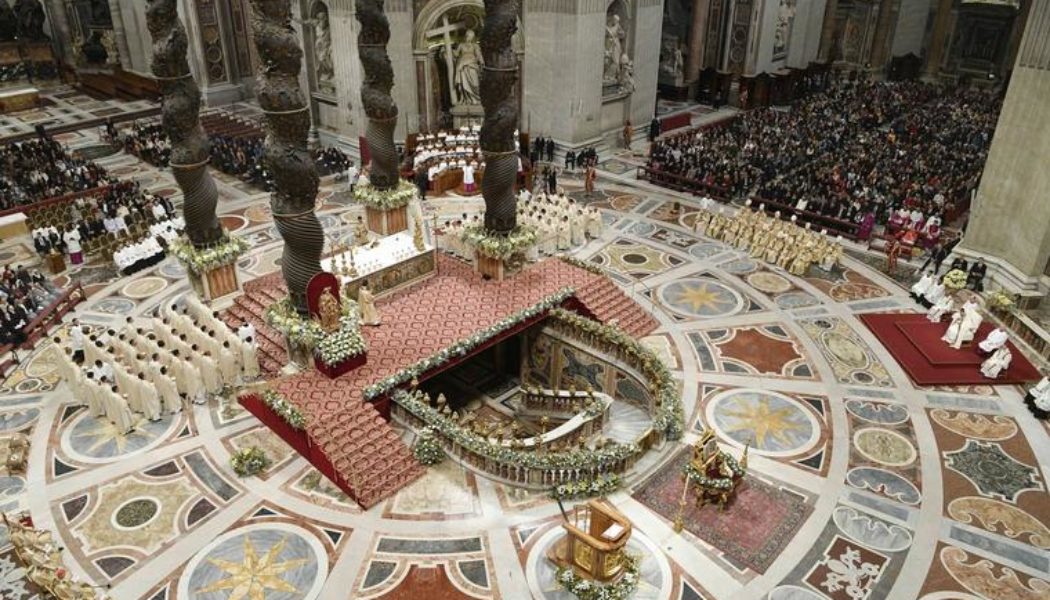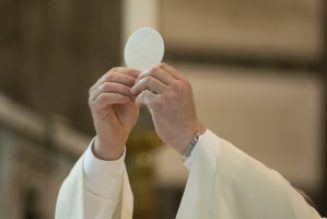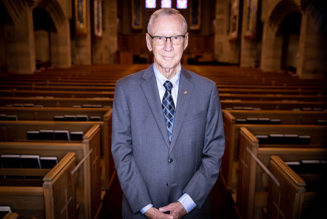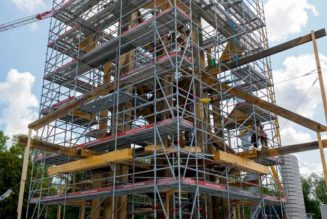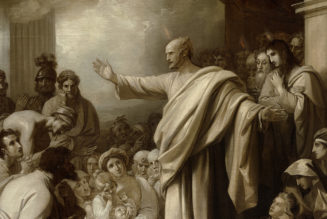
COMMENTARY: The Mass confusion of Christmas 2023 tells us something about how evening Masses have contributed to the secularization of Catholic culture.
That was quite a foofaraw. Christmas on a Monday!
Mass on Sunday (or Saturday) for the Fourth Sunday of Advent and then Mass again(!), on Sunday (or Monday) for Christmas. It seemed to create a lot of bother.
And it will happen again for the octave of Christmas, Jan. 1, 2024, the solemn feast of Mary, Mother of God. That too, like Christmas, is a holy day of obligation and it is a Monday, so all of the same considerations apply. Or not.
The whole business of Monday holy days was so exhausting that in 1991 the U.S. bishops decided that if Mary, Mother of God, the Assumption or All Saints fell on Saturday or Monday, then the obligation to attend Mass would be abrogated. So this coming Sunday/Monday there will be no foofaraw.
How did Catholics down the generations handle the onerous Sunday/Monday combination? Very simply. There were no evening Masses; the reforms of Pope St. Pius V in 1570 disallowed Masses after noon. So you went to Mass on Sunday morning for Sunday and then Monday morning for the holy day.
Easy.
Evening Masses were introduced more recently. Even the Mass of the Lord’s Supper and Easter Vigil were celebrated, odd as it may now seem, in the morning until Pope Pius XII reformed the Holy Week liturgies. In the 1960s the prohibition on evening Masses was eliminated.
The festive foofaraw of Christmas 2023 tells us something about how evening Masses have contributed to the secularization of Catholic culture.
Evening Masses on weekdays offer the opportunity for some people to get to Mass who might not be able to do so earlier in the day due to work. The same logic applied to the widespread introduction of Saturday evening anticipated Masses for the Lord’s Day; those impeded from getting to Mass on Sunday morning (very few people in fact) would be able to fulfill their Sunday obligation on Saturday evening.
While offering convenience — which is a fraught principle in liturgical matters — it unintentionally delivered a near-lethal blow to Sunday as the Lord’s Day, a day set apart. Many, perhaps a majority, of parishes commonly refer to “weekend Masses” even though such a thing does not exist. Sunday is the first day of the week, as the Gospel accounts of the Resurrection make clear. It is not the end of the week but the beginning.
To speak of “weekend Masses” is not a Christian way of speaking; bishops and priests who speak about “weekend Masses” have, unwittingly, abandoned the Lord’s Day in favor of the commercial concept of the weekend. Catholics who talk of “weekend Masses” give priority to the world of work over worship, and thereby profoundly undermine Christian culture. The Lord’s Day is the anchor of Christian culture; the weekend lifts that anchor so that the Church can flow with the secular commercial current.
Pope St. John Paul II lamented this — to no apparent effect — 25 years ago in his apostolic letter on the Lord’s Day, Dies Domini.
“Unfortunately, when Sunday loses its fundamental meaning and becomes merely part of a ‘weekend,’ it can happen that people stay locked within a horizon so limited that they can no longer see ‘the heavens,’” he wrote.
All of that is highlighted by the evening Masses on Christmas Eve, the multiplication of which caused all the discussion this year. All those Christmas Eve Masses have made Christmas Day itself something of an afterthought; in many parishes Mass on Christmas morning is the least solemn and least attended. Indeed, many parishes have fewer Masses on Christmas Day than they would on a regular Sunday.
Midnight Mass has two origins, one in Christian piety and the other in liturgical discipline. A fourth-century hymn, Quando Noctis Medium, speaks of the tradition that Jesus was born at midnight:
When in silence and in shade
Earth, at midnight, had been laid,
Working out the Father’s plan,
In the Virgin’s womb made man,
God His earthly life began.
By the fifth century, Pope St. Sixtus II was celebrating Mass at midnight in the Basilica of St. Mary Major. This custom developed into the pope celebrating three Masses — one at midnight (“of the angels”), one at dawn (“of the shepherds”) and one during the day (“of the Word”) back at St. Peter’s. This tradition is maintained today. There are four Masses — with four sets of readings — for Christmas: the vigil, during the night, dawn, and during the day.
Liturgical rules also reinforced the singularity of midnight. With no evening Masses, Catholics had to wait until Christmas Day for Mass. But so eager were they for the joy of the feast that they rushed to their churches at the first possible moment to celebrate Christmas. Only once a year did Catholics go to Mass at midnight. Christmas was unique.
All of that was blown up when evening Masses began on Christmas Eve. No need to wait for the first minutes of the new day when Christmas Mass can be slotted in at the same time as Mass is celebrated on every Saturday during the year. No need for a holy disruption of routine at midnight when Mass at 4 p.m. on Christmas Eve permits dinner to be had at the regular time.
Many parishes have their largest congregations at the earliest, i.e. most convenient, time so that Christmas worship does not intrude too much into Christmas. The Church unintentionally cooperates with all the secularizing forces arrayed against Christmas by getting all the religious bits over with as soon as possible.
Even the Vatican has given up the fight for midnight Mass. Pope Benedict XVI inexplicably moved “Midnight” Mass to 10 p.m., even though presumably the pope can adjust his rest given that he does not have other Masses to celebrate, or need to get up early to open the church. During the pandemic, Pope Francis moved the Mass to 7:30 p.m. to comply with Italy’s strict curfew, even though as sovereign of his own state, he had other options. The pandemic is over, but Mass is still at 7:30 p.m. at St. Peter’s. Given the late hour at which Italians dine, it would still be possible to make a dinner reservation.
Many Protestants, who generally put less emphasis on liturgical culture, still maintain the priority of Christmas Day — likely because they have not abandoned the weekly Lord’s Day for the weekend. This year the Holy Father had finished Christmas Mass more than 12 hours before King Charles III went to church on Christmas morning. Catholics may have something to learn.
Christmas next falls on a Monday in 2028. Perhaps by then some of the lessons of this year may be learned. How to avoid so many Masses when Dec. 24 is a Sunday?
Have fewer Masses on Christmas Eve. Let Christmas be Christmas — and the Lord’s Day be the Lord’s Day.
